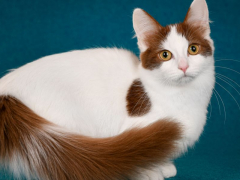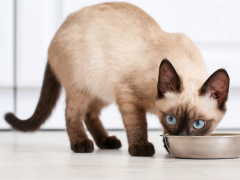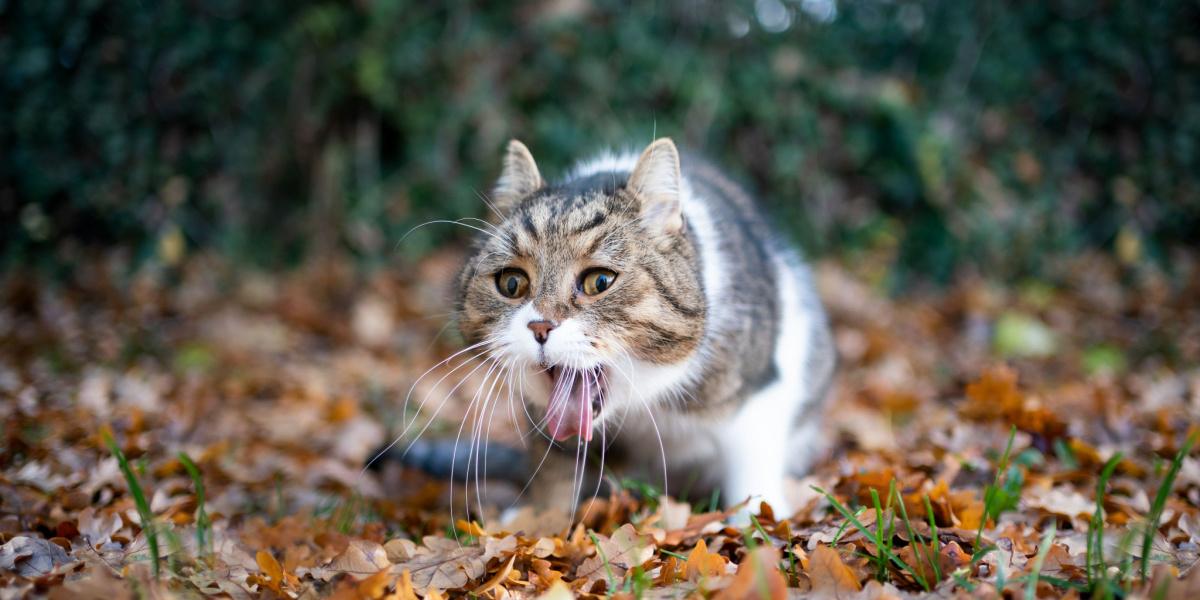
Talking about cat vomit never makes for pleasant conversation. But, when it comes to cat care, vomiting is quite an important topic. It becomes urgent when there’s blood involved. A cat vomiting blood, called hematemesis, is a serious medical issue that requires veterinary attention and care.
Are you sufficiently convinced that cat vomit is an issue worth talking about? We sure hope so.
Keep reading to learn more about blood in a cat’s vomit and what you can do if your cat is vomiting blood.
What Does Bloody Vomit Look Like?
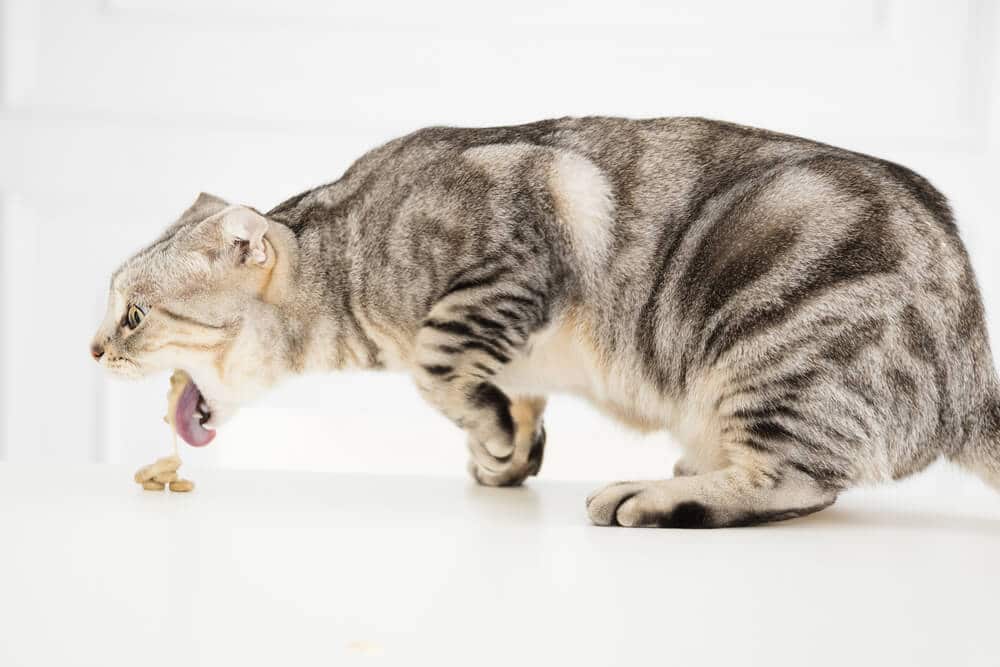
You can identify whether your cat is vomiting or regurgitating by observing him in the act. Regurgitating is quick and looks almost effortless.
Of course, blood in the vomit will be red. But there’s more to it than that. The blood’s color and consistency give clues as to why there’s blood in the vomit in the first place.
Bright, red flakes of blood in the vomit indicate a problem in the upper gastrointestinal (GI) tract, which includes the esophagus, stomach, and upper small intestine.
If the blood looks like coffee grounds, that signals a problem lower down in the GI tract, such as the lower small intestine and large intestine. The blood looks like coffee grounds because it has been partially digested.
No matter what the blood looks like, it’s never normal for cats to vomit blood.
Why Is My Cat Vomiting Blood?
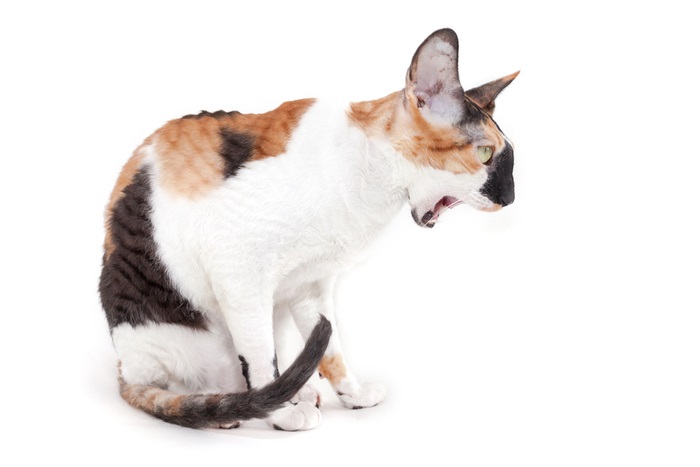
A cat throwing up blood may point to a variety of issues. All of them are serious.
Cats vomit blood for many reasons, none of which are good. We’ll go through these reasons below.
- GI tract ulcers- GI tract ulcers can occur when the protective soft tissue lining of the tract is damaged by infection. When that lining is damaged, it starts to bleed. In cats, bacterial infections are a common cause of GI tract ulcer. Cats with GI tract ulcers have other symptoms, such as loss of appetite, weight loss, and possibly bloody diarrhea.
- Foreign body ingestion- Cats are notorious for munching on string, which wreaks havoc when swallowed. The string gets caught and tangled in the intestines, causing inflammation of the GI tract lining that can eventually lead to blood in the vomit. Also, sharp foreign objects can cause physical tears to the lining, causing bleeding.
- Gingivitis- Gingivitis is inflammation of the gums. Inflamed gums, if not promptly treated, can start to bleed. A cat with bleeding gums will swallow this blood, feel ill, and vomit that blood right back up. Cats with gingivitis may have trouble eating and have excessive drooling.
- Inflammatory Bowel Disease (IBD)- The word ‘inflammatory’ says it all. Chronic inflammation in the intestines damages the lining. In addition to vomiting blood, cats with IBD often have diarrhea, weight loss, depression, and tiredness.
- Rat poison ingestion- Rat poison is effective at killing rats but is highly toxic for cats. A cat that ingests rat poison directly, or eats a rat that ingested the poison, will become very ill because of the poison’s toxic ingredients. These harmful ingredients cause clotting disorders that can ultimately lead to bloody vomit. Cats that ingest rat poison also have difficulty breathing, eat less, and have excessive thirst.
- Parasites- Internal parasites such as hookworms and heartworms can cause cats to vomit blood. Hookworms have tiny hooks that they use to latch on to the GI tract lining, causing the lining to bleed.
- Cancer- Mast cell tumors commonly cause bloody vomit in cats. Mast cells are immune cells that help to regulate how the body responds to allergies. When these cells go awry and form a tumor in the intestines, cats can vomit blood and exhibit other symptoms, such as diarrhea and discolored stool (tar or bright red).
- Clotting disorders- Cats with clotting disorders have a hard time forming blood clots, leading to excessive bleeding. One of these clotting disorders, called hemophilia, can cause cats to vomit blood. Fortunately, hemophilia in cats is rare.
- Medications- Non-steroidal anti-inflammatory medications are known to damage the GI tract lining, causing bleeding. This bleeding can lead to a cat vomiting blood.
What Should You Do?
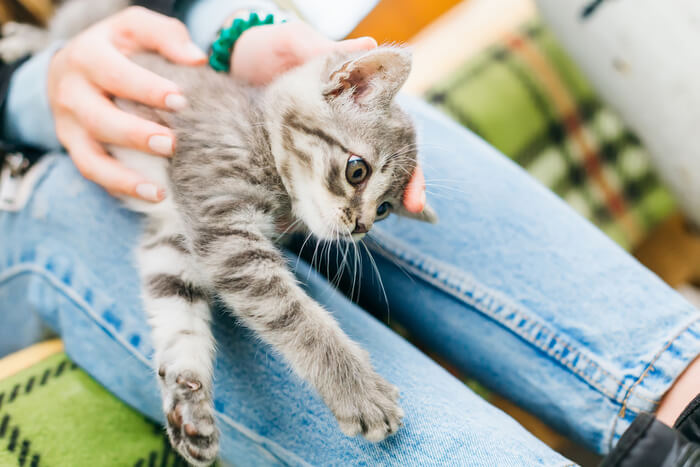
If your cat is vomiting blood, take action immediately. Contact your veterinarian as soon as you can and schedule an appointment.
Blood in cat vomit is not necessarily a life-threatening issue, but it does need to be taken seriously. If your cat is vomiting blood, contact your veterinarian promptly to schedule an appointment.
Your veterinarian will perform a thorough physical exam, ask you questions about the vomit, and perform diagnostic tests to determine why your cat is vomiting blood.
As concerned as you may be that your cat is vomiting blood, be prepared to provide as much detail as you can about the vomiting:
- When the vomiting started and how long it’s been going on
- Appearance of the blood in the vomit
- Other symptoms your cat is experiencing
- Ingestion of rat poison or a foreign body
In some instances, such as rat poison ingestion, it can help to bring a sample of the vomit with you for testing. However, check with your veterinarian first before collecting the sample.
After the initial history and physical exam, your veterinarian will perform whichever diagnostic tests will be most helpful in identifying the cause of the bloody vomit. Testing options include routine bloodwork, blood clotting tests, a fecal exam, and x-rays.
Treating a Cat That Is Vomiting Blood
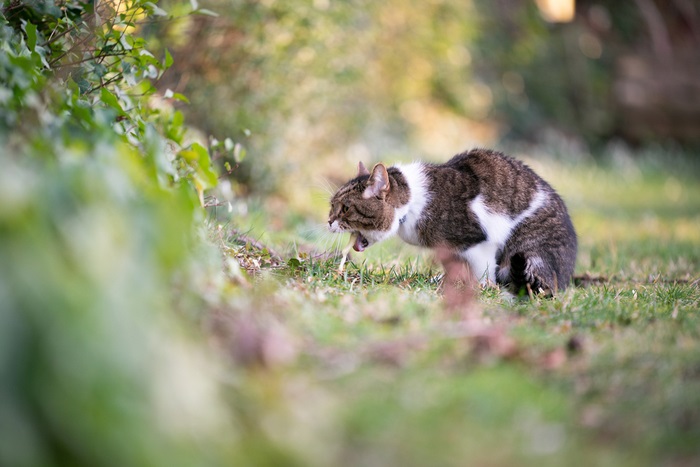
Treatment for a cat vomiting blood depends on the underlying condition and severity of the vomiting itself.
If your cat is vomiting blood, your veterinarian will determine the best course of treatment according to what’s causing the bloody vomit and how quickly your cat is losing blood.
Treatment options are listed below:
- Intravenous fluids to rehydrate your cat
- Anti-vomiting medications
- Medications to protect the GI tract lining
- Antibiotics to treat bacterial infections
- Dewormers to kill intestinal parasites
If your cat is critically ill, they will need to be hospitalized until they are stable and strong enough to return home.
Treating Your Cat at Home
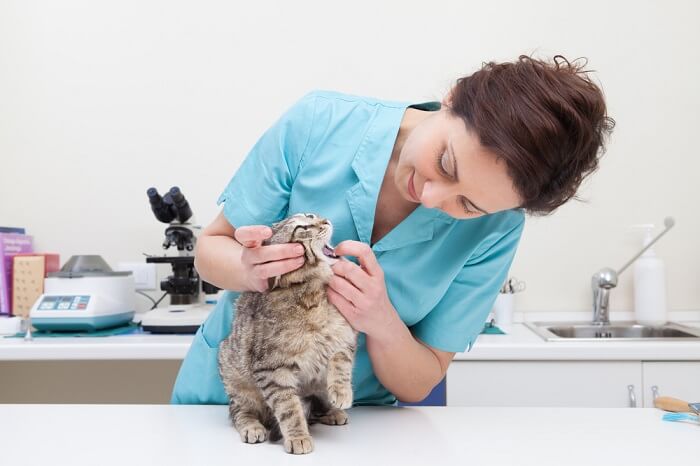
Follow all of your veterinarian’s treatment recommendations for your cat. In addition to medications that your cat may need, it is a good idea to feed your cat an easily digestible diet that is low in fat and fiber. This diet will provide your cat with nutrients but not make the GI tract work so hard when it needs to heal from the vomiting.
Bringing It Together

Cat vomit is never pleasant, especially when there’s blood involved. Blood in cat vomit signals an underlying health problem, so take your cat to your veterinarian if you notice blood in their vomit.
Follow your veterinarian’s treatment plan to get your cat back to good health.



